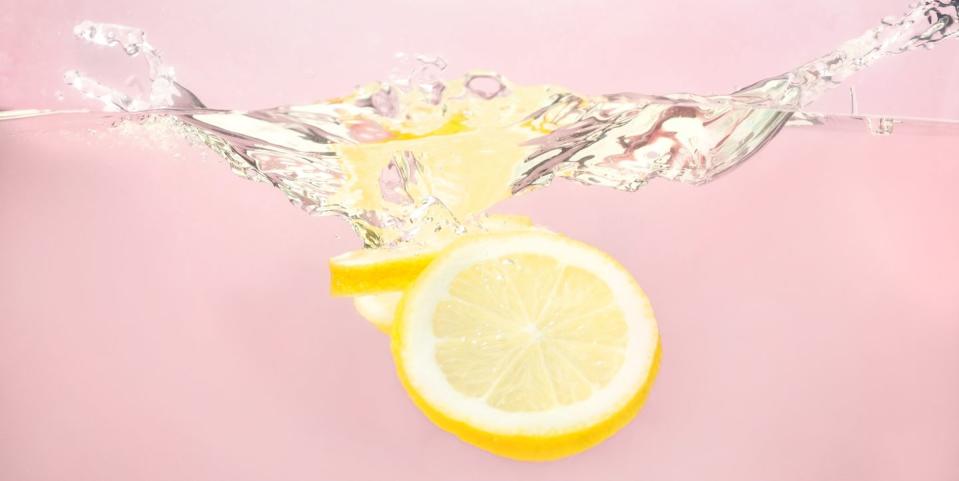Lemon Water Is Good for You, But Only If You're Using the Right Amount of Lemon

You know what triggers automatic eye-rolls in health writers like me? Claims about the miracle benefits of certain foods or ingredients — especially when it’s something that was in your great-great grandma’s fridge, back when they called it an ice box and only rich people had them.
Look, I get it: We’d all love to discover a simple, natural, inexpensive and not-totally-disgusting ingredient that will make us energetic, slender, radiant, sharp, and able to blow away a bad mood in a single bite.
But my default when I’m covering something like the benefits of lemon water is to think, If lemon water were so great, people who read about health for a living would have heard about it somewhere other than on social media. Especially when you have genetically stunning and already healthy-seeming celeb types like Gisele Bündchen, Lauren Conrad, and Miranda Kerr boosting the signal.
Related Video: 5 Lemon Cleaning Hacks You Never Knew Existed
Turns out, this is one case in which there are actual science-backed reasons to consider making this particular sip part of your daily routine. “I’m the first person to myth bust when it comes to nutrition, but as annoying as the lemon water rumors may be, there are certainly some benefits,” says dietician Lauren Slayton, M.S., R.D., founder of Foodtrainers in New York City. “I spend a good portion of my day discouraging people from trying semi-dangerous supplements and cutting out processed, crappy ingredients. So c’mon, let’s give lemon water a break.”
Before we get to the why you might want to drink lemon water, let’s define our terms. We’re not talking about that single floating spa slice to make water drinking prettier and slightly less boring. “When we discuss the benefits of lemon water, I’m referring to the juice of ½ or more of a lemon in water,” says Slayton, who likes this lemon and lime smusher to help her get the right amount. She also notes that organic lemons should be your main squeeze. “We want lemon water and not pesticide water, particularly if you let the lemon float in water.”
One caveat: Lemon water is safe, but you should also drink lots of plain water, according to the American Dental Association, because the acid in lemon and other citrus can erode tooth enamel over time.
The benefits of drinking lemon water
For one thing, it’s water. According to a report from the Centers for Disease Control and Prevention, almost 44% of women drink less than 4 cups a day. While how much you need depends on a bunch of things like how hot it is and how much exercise you get, many people walk around dehydrated, which can make you feel woozy, spaced out, and headachy. According to the CDC, you can get your fluid through juicy food and other beverages, but a low-sugar option like lemon water is a smart move. “Rehydrating first thing in the morning after sleep is a good habit,” says Slayton.
It can blunt your sweet tooth. Lemon water is sour and the peel is bitter. “Bitter foods are one tool to control sweet cravings,” says Slayton. Granted, this study was done on fruit flies, but there’s no downside to trying it yourself, especially if you like the taste.
It has good-for-you chemicals. These include antioxidants and flavonoids that may protect your cells from damage and help reduce inflammation. “Many of these compounds are found in the peel, so you want to use a little zest in that lemon water,” says Slayton. Vitamin C, in particular, is a powerful antioxidant, and although there isn’t a ton of it in the juice of half a lemon, lemon water adds to your intake.
Some find it helps with constipation. Slayton recommends you use warm lemon water if this is your main issue.
If you're prone to kidney stones, lemon water is your friend. These incredibly painful crystals form in your kidneys when substances (calcium, uric acid and oxalate) become concentrated, and drinking lemon water (with the juice of two lemons per day) can help prevent the stones from forming in the first place.
It may help your skin. While the amount of Vitamin C in lemons alone won’t make you forever young and spot-free, the antioxidant is protective against the effects of the sun, and so can help prevent wrinkles and discoloration. It’s also involved in collagen synthesis—collagen is the protein in your skin that keeps it plump.
It may help with blood sugar response. There is some research that showed that in a lab setting, lemon juice slowed the digestion of starch, leading to the thought that perhaps it do the same in real people in real life. This would potentially blunt the blood sugar response, making it less likely you’d store excess sugar in your blood as fat (this study on mice gets at that, and no, we’re not just giant mice, but since lemon water won’t hurt you, there’s no harm in trying.) Besides, “The more controlled our blood sugar, the better and more steady our energy is,” says Slayton.
Bottom line: Drinking lemon water is a small positive thing you can easily do. “On its own it isn’t going to morph you into a healthy person, but it’s a good and safe habit,” says Slayon. “Oftentimes healthy begets healthy and can pave the way for other positive changes.”
You Might Also Like

